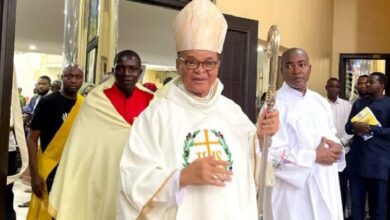Avoid alien practices in Catholic Liturgy
By Damian Avevor
The Ghana Catholic Bishops’ Conference (GCBC), has entreated all Archdioceses and Dioceses to set up and make functional Diocesan Liturgical Commissions to ensure that practices of other Christian Churches which did not reflect Catholic faith did not creep into Catholic liturgy.
The Bishops reminded Catholics that silence, veneration and meditation within the liturgy were Catholic traditional values that needed to be given due recognition and space in the liturgy.
In Pastoral Guideline to the Clergy, Religious and Laity in the wake of the 2014 Second National Pastoral Congress held at Sunyani, the Bishops noted that the liturgy of the Catholic Church “is the outstanding means by which the people of God express in their lives and manifest to others the mystery of Christ and the nature of the Church.”
“It is the daily living of the people of God that manifests the great mystery of Christ which is the mystery of salvation. It is in this daily living that the non-believer may find the love which God has shown to all people, and that makes it necessary that the Church links its liturgy to the daily life of the people of God.”
According to the Guidelines, the Catholic Church possessed so much treasure that it encouraged “Priests to make use of our Sacraments and sacramentals to respond to the needs of our people. This will restrain them from engaging the services of other Churches in their times of crisis.”
The Bishops noted in the Guidelines that “We need to be conscious of the multi-ethnic character of our urban Parishes and work towards the social integration of the various ethnic groups in our Parishes and Dioceses. In this connection, the different ethnic groups should be, as much as possible, allowed to participate fully in the liturgy in their own languages.”
“All Parishes of the Archdioceses and Dioceses are encouraged to establish a Sunday Children’s Liturgy, in the course of which Priests are encouraged to give homilies tailored to the understanding of children,” the Guidelines added.
The Guidelines stated that Pope St. John Paul II rightly observed that a faith that did not become culture was not fully accepted, not entirely thought out, not faithfully lived (Ecclesia.Africa. 59).
In the light of this, the Bishops considered inculturation an urgent priority in the life of the particular Churches, “for a firm rooting of the Gospel in Ghana. Indeed, inculturation is a requirement for evangelisation (E.A. 89), a path towards full evangelisation (cf. Africae Munus 36-38).”
On Social Communications to enhance the New Evangelisation, the Bishops said there was the need to revive and revitalise the Department of Social Communications in all our Archdioceses and Dioceses and provide guidelines for a responsible use of technological tools for our ministry.
The Church could help in the formation of media personnel to instil in them good ethical practices and in this regard, the Catholic University College of Ghana, Fiapre, should consider the introduction of a Course in Journalism to ensure proper training of Journalists for effective media work.
The Bishops noted that the Church should work through the Catholic Association of Media Practitioners-Ghana (CAMP-G) to promote unity and national development in their reportage.
The Guidelines encouraged Pastoral Agents to make good use of the social networks and media to reach out to the faithful. Qualified personnel should engage themselves in providing faith-based messages designed for the social media as a means of instructing the faithful through such media.
“We call upon Catholic individuals and associations to give sponsorship to such programmes as the Catholic Digest, Lumen Christi, and so on, to enable them to acquire better and more appropriate time for its programmes, especially for doctrinal and biblical teachings of the Church.”
The website of the Ghana Catholic Bishops’ Conference (www.cbcgha.org) should be better employed in furtherance of the New Evangelisation.
